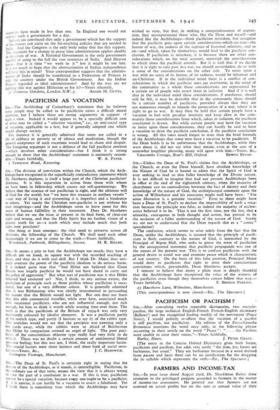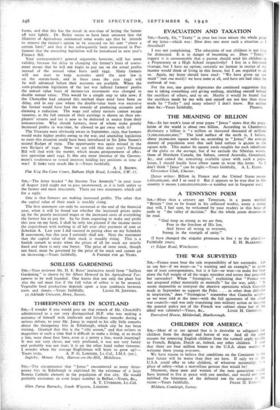FARMERS AND INCOME-TAX
Sta,—In your issue dated August 23rd, Dr. Shackleton Bailey drew attention to the privileged position accorded to farmers in the matter of income-tax assessment. He pointed out that farmers are not assessed on actual profits but on the rent or annual value of their farms, and that this has the result in war-time of letting the fanner off very lightly. Dr. Bailey seems to have been unaware that the Minister of Agriculture announced some weeks ago that he intends to remove the farmer's option to be assessed on his rent " above a certain limit," and that it has subsequently been announced in Par- liament that the amending legislation will be introduced in next year's Finance Bill.
Your correspondent's general argument, however, still has some validity, because the delay in changing the farmer's basis of assess- ment means that he will not begin to pay tax on the actual profits instead of the annual value basis until 1942. Many fanners will not start to keep accounts until the new law is on the statute-book, and in these cases the year 1942 will be well advanced before their accounts are available. When the corn-production legislation of the last war inflated farmers' profits the annual value basis of income-tax assessment was changed to double annual value. This would be a simple step to take now; if the Chancellor had adopted this method there need have been no delay, and in any case where the double-Value basis was excessive the farmer would have had the remedy of producing accounts and claiming a reduction. The wage and salary earners cannot escape taxation, as the full amount of their earnings is shown on their em- ployers' returns and tax is now to be deducted at source from their remuneration. Why should farmers, most of whom make greatly increased profits in war-time, be allowed to get away with it?
The Treasury were obviously aware in September, 1939, that farmers would make higher profits owing to the war, and amending legislation to meet this situation could have been introduced in Sir John Simon's second Budget of 1939. The opportunity was again missed in the two Budgets of 1940. Now we are told that next year's Finance Bill will deal with the matter, which means postponement of effec- tive operation until 1942. Is this one more instance of the Govern- ment's tenderness to vested interests holding key positions in time of war? It looks very much like it.—Yours faithfully,



























 Previous page
Previous page